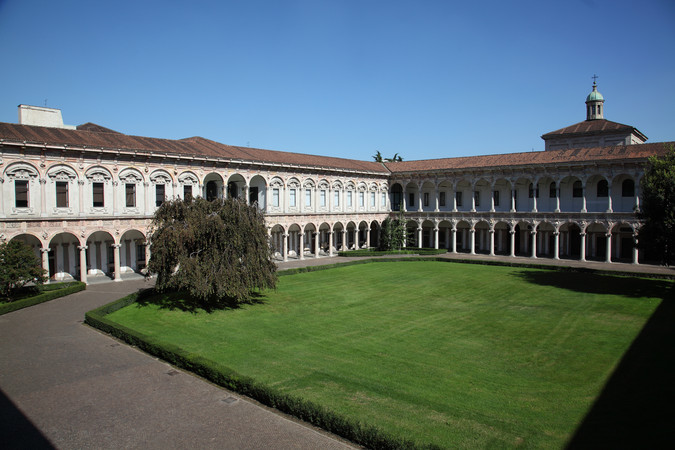Italy boasts world-renowned medical education, with prestigious universities like the University of Bologna and Sapienza University of Rome offering top-tier programs. With a rich history in medicine, state-of-the-art facilities, and immersive clinical experiences, Italy attracts students worldwide seeking excellence in medical training amidst a culturally rich environment.

Italy, famed for its rich history, art, and cuisine, is a captivating blend of ancient wonders and modern sophistication. From the iconic Colosseum in Rome to the Renaissance treasures of Florence and the picturesque canals of Venice, Italy's cultural heritage is unparalleled. Its cities pulsate with life, offering world-class fashion, gastronomy, and architectural marvels. Beyond the urban hubs, Italy's diverse landscapes, from the sun-drenched Amalfi Coast to the rolling hills of Tuscany, enchant visitors with their beauty. Italians are renowned for their passion for life, evident in their cuisine, wine, and warm hospitality, making Italy an irresistible destination for travelers worldwide.


The International Medical Admissions Test is a standardized exam used for admission to medical schools in Italy and a few other countries. It is mandatory to give IMAT and obtained valid pass score to get MBBS admission in Italy. It assesses critical thinking, problem-solving, and scientific knowledge in areas such as biology, chemistry, physics, and mathematics. It typically includes multiple-choice questions and is administered annually.

| Intake | August – September |
|---|---|
| Score Required in 10+2 | 70% in PCB |
| NEET Requirement | Yes, NEET Qualified |
| IMAT Requirement | Yes, IMAT Qualified |
| Fees For Private University | 10000 - 25000 Euro Per Year |
| Fees For Public University | Free |
| Hostel & Mess | 800 – 2000 Euro Per Month |
| Duration | 5+1 Years (Including Internship) |
| Medium of Instruction | English |
| Top Medical University | The Sapienza University of Rome The University of Bologna |
| Recognition | NMC, FAIMER, WFME, WHO, ECFMG |

The Sapienza University of Rome, one of the oldest and largest universities in Europe, offers a comprehensive medical program renowned for its academic excellence, cutting-edge research, and esteemed faculty. Founded in 1303, Sapienza has a rich history of nurturing some of the brightest minds in medicine and continues to uphold its tradition of innovation and leadership in healthcare education.
The medical program at Sapienza University of Rome is designed to provide students with a solid foundation in medical science, clinical skills, and research methodologies. The curriculum is structured to integrate theoretical knowledge with practical experience, ensuring that graduates are well-prepared to meet the challenges of modern healthcare.
The medical program at Sapienza is typically divided into preclinical and clinical phases, spanning six years of study. During the preclinical years, students focus on fundamental subjects such as anatomy, physiology, biochemistry, and pathology. These courses lay the groundwork for understanding the structure and function of the human body and the underlying mechanisms of disease.
As students progress to the clinical years, they engage in hands-on training in hospitals and clinical settings, where they apply their knowledge to diagnose and treat patients under the guidance of experienced physicians. Clinical rotations cover various specialties, including internal medicine, surgery, pediatrics, obstetrics and gynecology, psychiatry, and more, allowing students to gain exposure to a wide range of medical disciplines.
Sapienza University of Rome is committed to fostering research and innovation in medicine, providing students with ample opportunities to engage in cutting-edge research projects alongside faculty members. From basic science research to clinical trials and translational studies, students have access to state-of-the-art laboratories and facilities to pursue their research interests.
The medical faculty at Sapienza University of Rome comprises distinguished scholars, clinicians, and researchers who are leaders in their respective fields. With expertise spanning various specialties, faculty members are dedicated to providing students with mentorship, guidance, and support throughout their academic journey. In addition to faculty guidance, students have access to a wealth of resources, including libraries, online databases, and medical journals, to support their learning and research endeavors.
Clinical training is a cornerstone of the medical program at Sapienza, with students gaining hands-on experience in hospitals affiliated with the university. These include some of the most prestigious healthcare institutions in Rome, where students work alongside experienced clinicians and healthcare teams to care for patients across a wide range of medical conditions.
Clinical rotations provide students with invaluable opportunities to develop clinical skills, critical thinking abilities, and professionalism while delivering patient-centered care. Under the supervision of attending physicians, students learn to conduct patient interviews, perform physical examinations, interpret diagnostic tests, formulate treatment plans, and participate in surgical procedures, gaining practical experience that prepares them for residency training and future medical practice.
Sapienza University of Rome has a strong commitment to international collaboration and exchange, offering students the opportunity to participate in elective rotations and research projects abroad. Through partnerships with leading medical institutions worldwide, students can broaden their perspectives, gain exposure to different healthcare systems and cultures, and enhance their professional networks on a global scale.
With a strong foundation in medical science, clinical skills, and research methodologies, Sapienza alumni are equipped to make meaningful contributions to the field of medicine and improve the health and well-being of individuals and communities around the world.
The medical program at Sapienza University of Rome offers students a comprehensive education in medicine, combining rigorous academic training with hands-on clinical experience, research opportunities, and international collaboration. With a legacy of excellence spanning centuries, Sapienza continues to inspire and empower the next generation of healthcare professionals to lead and innovate in the ever-evolving field of medicine.

The University of Turin, located in the vibrant city of Turin, Italy, offers a comprehensive range of medical programs that are highly esteemed both nationally and internationally. With a rich history dating back to its founding in 1404, the university has continuously evolved to become a prestigious institution known for its excellence in medical education, research, and clinical practice.
The medical programs at the University of Turin are designed to provide students with a solid foundation in medical sciences, clinical skills, and research methodologies. These programs integrate rigorous academic coursework with hands-on clinical training, preparing students to excel in various healthcare settings and to make meaningful contributions to the field of medicine.
One of the flagship medical programs offered at the University of Turin is the Medicine and Surgery program, which is a six-year undergraduate program leading to a Doctor of Medicine (MD) degree. This program combines basic science courses, such as anatomy, physiology, and biochemistry, with clinical rotations in hospitals and healthcare facilities. Students learn from experienced faculty members who are experts in their respective fields, and they have access to state-of-the-art facilities and resources to support their education and training.
In addition to the Medicine and Surgery program, the University of Turin also offers several specialized medical programs at the postgraduate level. These include programs in areas such as Pediatrics, Obstetrics and Gynecology, Internal Medicine, Surgery, Psychiatry, and many others. These programs provide students with advanced training in their chosen specialty areas, allowing them to develop specialized knowledge and skills that are essential for their future careers as medical professionals.
The medical programs at the University of Turin are known for their emphasis on research and innovation. Students have the opportunity to engage in cutting-edge research projects under the guidance of faculty mentors, contributing to the advancement of medical knowledge and the development of new treatments and therapies. The university has a strong network of research institutes and collaborations with other institutions and organizations, providing students with access to a wide range of research opportunities and resources.
Clinical training is an integral part of the medical programs at the University of Turin. Students have the opportunity to gain hands-on experience in real-world healthcare settings, working alongside healthcare professionals and interacting with patients. Clinical rotations take place in affiliated hospitals and healthcare facilities throughout the region, exposing students to a diverse range of medical conditions and patient populations. This practical experience helps students develop essential clinical skills, bedside manner, and professional competencies that are crucial for their future roles as physicians.
The University of Turin is committed to providing a supportive and inclusive learning environment for all students. Faculty members and staff are dedicated to fostering a culture of academic excellence, collaboration, and respect. The university offers a range of support services to help students succeed, including academic advising, tutoring, counseling, and career guidance. Additionally, the university promotes diversity and multiculturalism, welcoming students from diverse backgrounds and experiences.
Upon completion of their medical education, graduates of the University of Turin are well-prepared to pursue various career paths in the field of medicine. Many graduates go on to become physicians, practicing in hospitals, clinics, and private practices. Others pursue careers in medical research, academia, public health, healthcare administration, and other related fields.
The University of Turin offers a world-class medical education that prepares students to become competent, compassionate, and ethical healthcare professionals. With its strong emphasis on academic excellence, research, clinical training, and student support, the university provides an ideal environment for aspiring physicians to pursue their passion for medicine and to make a difference in the world of healthcare.

The University of Udine, located in the picturesque region of Friuli-Venezia Giulia in northeastern Italy, offers an array of medical programs designed to train the next generation of healthcare professionals. Among its offerings, the Medical Programme stands out as a flagship curriculum renowned for its comprehensive education, cutting-edge research opportunities, and commitment to producing skilled, compassionate physicians.
Established in 1978, the Medical Programme at the University of Udine has a rich history of excellence in medical education and research. Rooted in the university's overarching mission to foster academic excellence, promote scientific inquiry, and serve the community, the program is dedicated to training competent and empathetic physicians who can address the evolving healthcare needs of society.
The Medical Programme at the University of Udine follows a rigorous curriculum designed to equip students with the knowledge, skills, and clinical experience necessary for a successful medical career. The curriculum integrates foundational science courses with clinical training, research opportunities, and practical experiences in healthcare settings.
Students begin their journey with a solid grounding in basic sciences, including anatomy, physiology, biochemistry, and pharmacology. These courses provide the essential knowledge needed to understand the structure and function of the human body and the mechanisms of health and disease.
As students progress through the program, they transition to clinical training, where they learn to apply their knowledge in real-world healthcare settings. Under the guidance of experienced physicians, students rotate through various clinical specialties, gaining hands-on experience in areas such as internal medicine, surgery, pediatrics, obstetrics and gynecology, psychiatry, and more.
The University of Udine is committed to fostering a culture of research and innovation. Students in the Medical Programme have the opportunity to engage in research projects under the mentorship of faculty members, contributing to advancements in medical science and gaining valuable research skills that complement their clinical training.
At the heart of the Medical Programme are its dedicated faculty members who are experts in their respective fields and committed to the success of their students. The faculty comprises clinicians, researchers, and educators who bring a wealth of knowledge and experience to the classroom and clinical settings. Through mentorship, guidance, and support, faculty members play a critical role in shaping the educational experience and fostering the professional development of students.
The University of Udine also boasts state-of-the-art facilities and resources to support medical education and research. From modern lecture halls and laboratories to simulation centers and clinical training sites, students have access to the tools and technology needed to excel in their studies and training.
A cornerstone of the Medical Programme is its emphasis on clinical rotations and internships, where students have the opportunity to apply their classroom learning in real clinical settings. Through rotations at affiliated hospitals, clinics, and healthcare facilities, students gain firsthand experience working with patients, collaborating with multidisciplinary healthcare teams, and honing their clinical skills under the supervision of experienced physicians.
These clinical experiences provide invaluable learning opportunities, allowing students to encounter a diverse range of medical conditions, interact with patients from different backgrounds, and develop the communication, teamwork, and problem-solving skills essential for effective medical practice.
In an increasingly interconnected world, the University of Udine recognizes the importance of global health and collaboration. Through international exchange programs, research collaborations, and partnerships with institutions around the world, students in the Medical Programme have the opportunity to gain exposure to diverse healthcare systems, cultures, and perspectives, enriching their education and broadening their understanding of global health issues.
The Medical Programme at the University of Udine offers a comprehensive and rigorous education designed to prepare students for successful careers in medicine. With a strong emphasis on foundational sciences, clinical training, research opportunities, and community engagement, the program equips students with the knowledge, skills, and values needed to excel as physicians and make meaningful contributions to the health and well-being of individuals and communities. Through its commitment to excellence, innovation, and service, the University of Udine remains at the forefront of medical education and research, shaping the future of healthcare in Italy and beyond.

The University of Pisa, located in Pisa, Italy, is renowned for its prestigious medical programs. Offering a comprehensive education in medicine, the university attracts students from around the globe seeking top-tier medical training. This article delves into the medical program at the University of Pisa, highlighting its curriculum, facilities, research opportunities, and the overall student experience.
The University of Pisa, established in 1343, stands as one of the oldest and most esteemed universities in Italy. Its medical program is among its flagship offerings, characterized by a blend of tradition and innovation. Situated in a vibrant city renowned for its historical significance and cultural richness, the university provides an enriching environment conducive to learning and personal growth.
The medical program at the University of Pisa is structured to provide students with a comprehensive understanding of medical sciences while nurturing their clinical skills and research acumen. The curriculum encompasses foundational courses in anatomy, physiology, biochemistry, and pharmacology, laying a solid groundwork for advanced medical studies.
As students progress through the program, they delve deeper into specialized fields such as pathology, microbiology, and immunology. Clinical rotations form a crucial component of the curriculum, allowing students to gain hands-on experience in various medical specialties under the guidance of experienced clinicians.
The university emphasizes a multidisciplinary approach, integrating lectures, laboratory sessions, seminars, and clinical placements to foster a well-rounded education. Furthermore, students have the opportunity to participate in elective courses and research projects tailored to their interests, enhancing their academic experience and professional development.
The University of Pisa boasts state-of-the-art facilities and resources to support medical education and research. Modern laboratories equipped with advanced instrumentation enable students to conduct experiments and investigations across diverse scientific disciplines.
Moreover, the university's affiliated teaching hospitals provide an unparalleled learning environment, where students interact with patients, observe medical procedures, and work alongside seasoned healthcare professionals. These hospitals offer a wide range of clinical specialties, ensuring that students receive comprehensive exposure to various aspects of medical practice.
In addition to physical infrastructure, the university provides access to extensive digital resources, including online libraries, databases, and medical journals. This wealth of information facilitates research endeavors and enables students to stay abreast of the latest developments in their respective fields.
The University of Pisa is committed to fostering a culture of scientific inquiry and innovation. As such, students are encouraged to engage in research activities under the guidance of faculty mentors. Whether conducting laboratory experiments, clinical trials, or literature reviews, students have the opportunity to contribute to cutting-edge research projects that address pressing medical challenges.
The university's research centers and institutes serve as hubs of scientific excellence, providing students with access to specialized equipment, collaborative networks, and funding opportunities. Whether pursuing basic science or translational research, students benefit from a supportive ecosystem that nurtures their intellectual curiosity and fosters academic achievement.
The medical program at the University of Pisa offers a rich and rewarding student experience characterized by academic rigor, cultural enrichment, and personal growth. Students from diverse backgrounds come together to form a vibrant community bound by their passion for medicine and shared pursuit of excellence.
The medical program at the University of Pisa stands as a beacon of excellence in medical education and research. With its comprehensive curriculum, state-of-the-art facilities, research opportunities, and vibrant student community, the university offers an unparalleled learning experience for aspiring healthcare professionals. By combining academic rigor with practical experience and fostering a culture of innovation and inquiry, the University of Pisa prepares students to excel in the dynamic and challenging field of medicine, shaping the future of healthcare one student at a time.

The University of Milan, situated in the vibrant city of Milan, Italy, is renowned for its excellence in various academic fields, including medicine. Its medical program stands as a beacon of quality education, attracting students from all over the world who aspire to become proficient healthcare professionals. In this discourse, we delve into the intricacies of the medical program at the University of Milan, exploring its curriculum, facilities, research opportunities, and the unique advantages it offers to its students.
The medical program at the University of Milan is designed to equip students with a comprehensive understanding of medical sciences, clinical skills, and research methodologies. It follows a rigorous curriculum that integrates theoretical knowledge with practical experience, ensuring that graduates are well-prepared to meet the challenges of modern healthcare.
The curriculum is structured to provide a solid foundation in basic sciences such as anatomy, physiology, biochemistry, and pharmacology. As students progress through the program, they engage in clinical rotations across various specialties, including internal medicine, surgery, pediatrics, obstetrics, and psychiatry.
The program also emphasizes interdisciplinary learning, encouraging students to explore connections between different branches of medicine and collaborate with professionals from diverse backgrounds. This approach fosters a holistic understanding of healthcare and prepares students to address complex medical issues.
Clinical training is a pivotal aspect of the medical program at the University of Milan. Students have the opportunity to gain hands-on experience in state-of-the-art medical facilities affiliated with the university, including renowned hospitals and research centers. Under the guidance of experienced clinicians, students actively participate in patient care, diagnostic procedures, and treatment planning, thereby honing their clinical skills and judgment.
The University of Milan is at the forefront of medical research, with faculty members engaged in groundbreaking studies across various disciplines. Students in the medical program have access to a wealth of research opportunities, ranging from basic laboratory research to clinical trials and epidemiological studies.
The university encourages students to pursue research projects under the mentorship of faculty members, fostering critical thinking, problem-solving, and innovation. Engaging in research not only enhances students' understanding of medical science but also prepares them to contribute to the advancement of healthcare through evidence-based practice.
With its diverse student body and global network of collaborators, the University of Milan offers students a truly international perspective on medicine. The medical program welcomes students from different cultural and academic backgrounds, fostering an environment of cross-cultural exchange and collaboration.
Moreover, the university has partnerships with institutions worldwide, enabling students to participate in exchange programs, elective rotations, and research collaborations abroad. These experiences broaden students' horizons, expose them to different healthcare systems and practices, and cultivate skills essential for working in multicultural settings.
The medical program at the University of Milan offers a rigorous yet rewarding educational experience for aspiring healthcare professionals. With its comprehensive curriculum, state-of-the-art facilities, research opportunities, and international perspective, the program equips students with the knowledge, skills, and values necessary to excel in the dynamic field of medicine.
Whether students aspire to pursue clinical practice, research, education, or healthcare leadership, the University of Milan provides a solid foundation upon which they can build successful and fulfilling careers. By fostering excellence, innovation, and compassion, the medical program at the University of Milan continues to shape the future of healthcare, both locally and globally.

The University of Florence, located in the heart of the historic city of Florence, Italy, offers a comprehensive medical program that encompasses both undergraduate and graduate studies. Renowned for its rich history, cultural heritage, and academic excellence, the University of Florence provides a dynamic environment for students pursuing a career in medicine. This article delves into the structure, curriculum, and notable aspects of the medical program at the University of Florence.
Founded in 1321, the University of Florence is one of the oldest and most prestigious universities in Italy. It has a strong reputation for research, innovation, and academic excellence across various disciplines, including medicine. The university's medical program attracts students from around the world seeking high-quality education and training in the field of healthcare.
The medical program at the University of Florence follows a structured curriculum designed to provide students with a comprehensive understanding of medical sciences, clinical skills, and research methodologies. The program is divided into different stages, including undergraduate, graduate, and postgraduate levels.
The undergraduate medical curriculum typically spans six years and leads to the award of a Doctor of Medicine (MD) degree. During the initial years of the program, students focus on foundational courses in basic sciences such as anatomy, physiology, biochemistry, and pharmacology. They also engage in pre-clinical studies to develop a strong theoretical understanding of medical principles and concepts.
As students progress through the program, they transition to clinical rotations where they gain hands-on experience in hospital settings under the supervision of experienced healthcare professionals. Clinical rotations cover various specialties, including internal medicine, surgery, pediatrics, obstetrics and gynecology, psychiatry, and more. These rotations allow students to apply their knowledge in real-world medical scenarios, interact with patients, and hone their diagnostic and patient management skills.
Upon completing their undergraduate degree, students have the option to pursue further specialization through graduate studies and residency programs. The University of Florence offers a range of postgraduate medical courses and residency programs in collaboration with affiliated hospitals and healthcare institutions.
Graduate studies enable students to delve deeper into specific medical specialties or research areas of interest. Whether it's cardiology, neurology, oncology, or any other field, students have access to advanced training and mentorship from leading experts in their respective fields. Additionally, graduate programs often involve research projects or dissertations, allowing students to contribute to the advancement of medical knowledge through scientific inquiry.
After completing residency programs, medical graduates may choose to pursue further specialization through fellowship programs or enter clinical practice. The University of Florence provides opportunities for continuing medical education to ensure that healthcare professionals stay updated with the latest advancements in their field.
The University of Florence is renowned for its contributions to medical research and innovation. Students have access to state-of-the-art research facilities, laboratories, and resources to pursue research projects in collaboration with faculty members and research institutes. Engaging in research not only enhances students' understanding of medical sciences but also fosters critical thinking, problem-solving skills, and scientific inquiry.
The medical program emphasizes hands-on clinical training to ensure that students develop the necessary skills and competencies required for clinical practice. Clinical rotations provide exposure to diverse patient populations, medical conditions, and treatment modalities, allowing students to become proficient in diagnosing and managing a wide range of health issues.
The University of Florence fosters international collaboration and exchange programs with universities and healthcare institutions worldwide. This global perspective enriches students' educational experience by exposing them to different healthcare systems, cultural practices, and medical challenges. International collaboration also facilitates knowledge sharing, cross-cultural learning, and networking opportunities for students and faculty members alike.
The medical program at the University of Florence offers a comprehensive and rigorous educational experience that prepares students for successful careers in medicine. With its emphasis on academic excellence, clinical training, research opportunities, international collaboration, interdisciplinary approach, and community engagement, the University of Florence equips students with the knowledge, skills, and values needed to make meaningful contributions to healthcare and improve the well-being of individuals and communities worldwide.

The University of Bologna, located in Bologna, Italy, is one of the oldest universities in the world, tracing its origins back to the 11th century. It is renowned for its long-standing tradition of academic excellence and innovation, offering a wide range of programs across various disciplines, including medicine.
The medical program at the University of Bologna is highly esteemed, attracting students from around the globe who aspire to pursue a career in medicine. This program is designed to equip students with the knowledge, skills, and practical experience necessary to become competent and compassionate healthcare professionals.
The medical program at the University of Bologna has a rich history dating back several centuries. It has evolved over time to meet the changing demands of the healthcare industry and to incorporate advancements in medical science and technology. Today, the program is at the forefront of medical education, combining traditional teaching methods with modern approaches to ensure that students receive a comprehensive and up-to-date education.
The curriculum of the medical program at the University of Bologna is comprehensive and rigorous, covering a wide range of subjects related to basic medical sciences, clinical medicine, and practical skills. Students typically begin their studies with foundational courses in anatomy, physiology, biochemistry, and medical ethics. As they progress through the program, they delve deeper into specialized areas such as pathology, pharmacology, microbiology, and immunology.
The medical program at the University of Bologna employs a variety of teaching methods to cater to the diverse learning styles and preferences of students. These may include lectures, seminars, laboratory sessions, small group discussions, and clinical rotations. The university also utilizes modern educational technologies and resources to enhance the learning experience, such as virtual simulations, online resources, and interactive multimedia tools.
The faculty members of the medical program at the University of Bologna are highly qualified and experienced professionals who are dedicated to excellence in teaching, research, and patient care. They come from diverse backgrounds and specialties, providing students with a wealth of knowledge and expertise. Additionally, the university boasts state-of-the-art facilities, including laboratories, research centers, and affiliated hospitals, where students can engage in cutting-edge research and clinical practice.
Research is an integral component of the medical program at the University of Bologna, with students encouraged to participate in research projects and scholarly activities. Whether conducting basic science research in the laboratory or clinical research in healthcare settings, students have the opportunity to contribute to advancements in medical knowledge and practice. The university provides support and resources for students interested in pursuing research, including access to funding, mentorship, and collaboration opportunities.
Clinical rotations and internships are an essential part of the medical program at the University of Bologna, allowing students to gain practical experience in various medical specialties and healthcare settings. During these rotations, students work closely with attending physicians and other healthcare professionals, participating in patient care, medical rounds, and diagnostic procedures. This hands-on experience helps students develop clinical skills, build confidence, and prepare for their future careers as physicians.
The University of Bologna is committed to providing students with opportunities for international exposure and collaboration. The medical program offers exchange programs, elective rotations, and clinical placements abroad, allowing students to gain valuable experience in different healthcare systems and cultural contexts. Additionally, the university has partnerships with renowned institutions worldwide, facilitating research collaborations and academic exchanges.
Graduates of the medical program at the University of Bologna are well-prepared to pursue various career paths in the field of medicine. Many choose to continue their training through residency programs in their chosen specialty, while others opt for careers in clinical practice, research, academia, public health, or healthcare administration. The reputation and quality of education offered by the University of Bologna open doors to diverse opportunities both nationally and internationally.
The medical program at the University of Bologna is a prestigious and comprehensive educational program that prepares students for successful careers in medicine. With its rich history, world-class faculty, state-of-the-art facilities, and emphasis on research and clinical training, the program continues to attract talented individuals who are passionate about making a difference in healthcare. Whether aspiring to become clinicians, researchers, educators, or leaders in the field, graduates of the University of Bologna's medical program are equipped with the knowledge, skills, and experience to excel in their chosen paths.

The University of Bari, located in the historic city of Bari, Italy, offers a diverse range of medical programs that are highly regarded both domestically and internationally. These programs are designed to provide students with a comprehensive education in various fields of medicine, preparing them for careers as healthcare professionals, researchers, and leaders in the medical community. From undergraduate to postgraduate levels, the University of Bari's medical programs emphasize academic excellence, hands-on training, and cutting-edge research, ensuring that graduates are well-equipped to address the healthcare challenges of the 21st century.
At the undergraduate level, the University of Bari offers a Bachelor of Medicine and Bachelor of Surgery (MBBS) program, also known as the "Medicina e Chirurgia" program in Italian. This six-year program provides students with a solid foundation in the biomedical sciences, clinical skills, and patient care. The curriculum covers a wide range of subjects, including anatomy, physiology, pathology, pharmacology, and clinical medicine. Students also have the opportunity to gain practical experience through clinical rotations at affiliated hospitals and healthcare facilities, where they work alongside experienced physicians and healthcare professionals.
In addition to the MBBS program, the University of Bari offers several postgraduate medical programs for students who wish to specialize in a particular area of medicine. These programs include Master of Science (MSc) degrees in fields such as internal medicine, surgery, pediatrics, obstetrics and gynecology, psychiatry, and public health. Each program is designed to provide students with advanced training and specialized knowledge in their chosen field, preparing them for careers as specialist physicians, researchers, or educators.
One of the distinctive features of the University of Bari's medical programs is its emphasis on research and innovation. The university is home to several research centers and institutes dedicated to advancing medical knowledge and improving patient care. Faculty members and students are actively involved in research projects across a wide range of disciplines, including molecular biology, genetics, neuroscience, and epidemiology. Through these research activities, students have the opportunity to contribute to the advancement of medical science while gaining valuable research skills and experience.
Another strength of the University of Bari's medical programs is its strong network of clinical partners. The university has affiliations with several hospitals and healthcare institutions in the Bari area, providing students with access to a diverse range of clinical settings and patient populations. Clinical rotations are an integral part of the curriculum, allowing students to apply their knowledge and skills in real-world healthcare environments under the supervision of experienced clinicians. These clinical experiences help students develop clinical competence, professionalism, and empathy, essential qualities for effective healthcare practice.
The University of Bari is committed to providing a supportive learning environment for its students, with dedicated faculty members who are experts in their fields. Faculty members are actively involved in teaching, mentoring, and advising students, providing them with personalized support and guidance throughout their academic journey. The university also offers a variety of resources and support services to help students succeed, including academic counseling, tutoring, and career guidance.
The University of Bari offers a comprehensive and dynamic medical education that prepares students for successful careers in medicine and healthcare. With its strong emphasis on academic excellence, research, clinical training, and community engagement, the university equips graduates with the knowledge, skills, and values they need to excel as compassionate and competent healthcare professionals in an ever-evolving healthcare landscape. Whether students aspire to become physicians, researchers, educators, or healthcare leaders, the University of Bari provides them with the tools and opportunities they need to achieve their goals and make a meaningful difference in the world of medicine.

Humanitas University, located in Italy, is a prestigious institution renowned for its exceptional medical programs. Established with a vision to train competent healthcare professionals equipped with the latest medical knowledge and practical skills, Humanitas University offers an enriching educational experience that prepares students for successful careers in the field of medicine. This article aims to delve into the various aspects of the medical program at Humanitas University, highlighting its curriculum, facilities, faculty, and unique features that set it apart.
Humanitas University's medical program is designed to provide students with a comprehensive understanding of medical science, clinical practice, and research methodologies. The curriculum is structured to incorporate both theoretical learning and hands-on experience, ensuring that students develop a strong foundation in basic sciences while also gaining practical exposure to patient care from the early stages of their education.
At the core of the medical program is a rigorous curriculum that covers a wide range of subjects including anatomy, physiology, biochemistry, pathology, pharmacology, and clinical medicine. Students are introduced to these disciplines through interactive lectures, laboratory sessions, and clinical rotations, allowing them to integrate theoretical knowledge with real-world clinical scenarios. The curriculum is continuously updated to reflect advancements in medical science and technology, ensuring that students are equipped with the latest evidence-based practices.
One of the distinctive features of Humanitas University's medical program is its emphasis on interdisciplinary learning and collaboration. Students have the opportunity to engage in interdisciplinary projects and research initiatives, working alongside faculty members and experts from diverse fields such as biomedical engineering, genetics, and public health. This interdisciplinary approach not only broadens students' perspectives but also fosters innovation and creativity in addressing complex healthcare challenges.
Clinical training is an integral part of the medical program at Humanitas University, with students gaining hands-on experience through rotations in affiliated hospitals and healthcare facilities. Under the guidance of experienced clinicians and faculty members, students have the opportunity to interact with patients, participate in medical rounds, and observe various medical procedures across different specialties. This clinical exposure not only enhances students' clinical skills but also instills in them the importance of empathy, professionalism, and ethical practice.
The faculty members at Humanitas University are distinguished experts and practitioners in their respective fields, committed to providing high-quality education and mentorship to students. With a diverse mix of clinical experience, academic expertise, and research accomplishments, the faculty brings a wealth of knowledge and insights into the classroom, enriching the learning experience for students. Moreover, the faculty members are actively involved in research and scholarly activities, creating opportunities for students to participate in research projects and gain valuable research experience.
Humanitas University places a strong emphasis on internationalization and global engagement, welcoming students from diverse cultural and educational backgrounds. The university offers various exchange programs, internships, and clinical rotations in collaboration with renowned institutions and organizations worldwide. These international experiences not only expose students to different healthcare systems and practices but also promote cultural exchange and cross-cultural understanding.
In addition to academic and clinical training, Humanitas University provides comprehensive support services to help students succeed in their medical education journey. From academic advising and tutoring to career counseling and personal support, the university offers a range of resources and programs to address students' academic, professional, and personal needs. Moreover, the university fosters a supportive and inclusive learning environment, where students are encouraged to collaborate, communicate, and learn from each other.
Humanitas University offers a comprehensive and enriching medical program that prepares students to excel as competent and compassionate healthcare professionals. With its rigorous curriculum, hands-on clinical training, interdisciplinary approach, state-of-the-art facilities, and global engagement opportunities, Humanitas University is at the forefront of medical education, shaping the future of healthcare one student at a time.

The Biomedical University of Rome, known as "Università Campus Bio-Medico di Roma" in Italian, is a prestigious institution located in Rome, Italy. Established in 1993, it has quickly gained recognition for its excellence in biomedical education and research. The university is committed to providing high-quality medical programs that integrate cutting-edge technology with a strong foundation in scientific principles and ethical practices. With a focus on interdisciplinary collaboration and practical training, the Biomedical University of Rome offers a range of medical programs designed to prepare students for successful careers in healthcare.
One of the flagship programs offered by the Biomedical University of Rome is its medical degree program, which provides students with comprehensive training in medicine and surgery. This six-year program combines theoretical coursework with hands-on clinical experience, allowing students to develop the knowledge, skills, and professionalism necessary to become competent physicians. The curriculum covers a broad range of subjects, including anatomy, physiology, pathology, pharmacology, and clinical medicine. Students also have the opportunity to participate in research projects and clinical rotations at affiliated hospitals and healthcare facilities, gaining exposure to a variety of medical specialties and patient populations.
The medical program at the Biomedical University of Rome places a strong emphasis on practical training, with students spending a significant amount of time in clinical settings under the supervision of experienced physicians. This hands-on experience is essential for developing clinical skills such as patient assessment, diagnosis, and treatment planning. Students also have the opportunity to participate in multidisciplinary team-based care, working alongside other healthcare professionals to deliver comprehensive patient care.
In addition to the medical degree program, the Biomedical University of Rome offers a range of specialized master's programs and postgraduate courses in various fields of medicine and healthcare. These programs are designed for healthcare professionals looking to enhance their skills and knowledge in specific areas such as medical imaging, nursing, physiotherapy, and biomedical engineering. With a focus on practical training and clinical research, these programs provide students with the opportunity to advance their careers and make meaningful contributions to the field of healthcare.
The Biomedical University of Rome is also actively involved in medical research, with faculty members conducting cutting-edge research in areas such as cancer biology, neuroscience, cardiovascular disease, and infectious diseases. Through collaborative research projects and partnerships with other institutions, the university is dedicated to advancing scientific knowledge and developing innovative approaches to healthcare. Students have the opportunity to participate in research activities and gain valuable experience working alongside faculty members on groundbreaking research projects.
The Biomedical University of Rome offers a comprehensive medical education experience that combines rigorous academic training with hands-on clinical experience and opportunities for research and community engagement. With its commitment to excellence and innovation in healthcare education and research, the university is shaping the future of medicine and producing the next generation of healthcare leaders. Whether students aspire to become physicians, researchers, or healthcare professionals, the Biomedical University of Rome provides the knowledge, skills, and resources needed to succeed in today's rapidly evolving healthcare landscape.